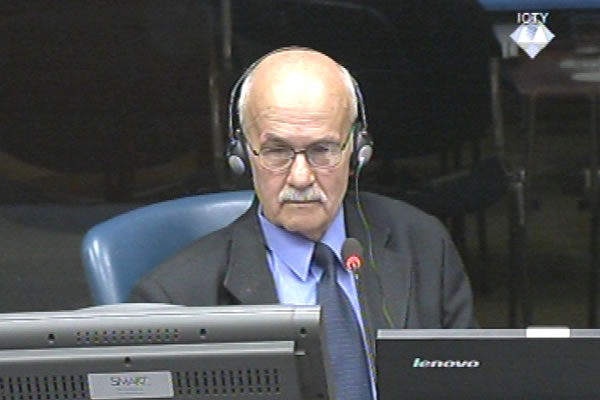Home
LETING HUMANITARIAN CONVOYS THROUGH
In his evidence in Mladic’s defense, Colonel Slavko Kralj said that during the war the Bosnian Serb army regularly let the convoys with humanitarian aid for the Muslim and Croat enclaves in BH pass through their territory. The prosecutor confronted Kralj with a letter from the Main Staff in which Karadzic’s Directive 7 is invoked. The troops are ordered to "reduce and limit [the logistic support of UNPROFOR to the enclaves and] the supply of material resources to the Muslim population... through planned and unobtrusively restrictive issuing of permits"
 Slavko Kralj, defence witness at Rako Mladic trial
Slavko Kralj, defence witness at Rako Mladic trial As alleged in the indictment against Ratko Mladic, the joint criminal enterprise aimed at achieving the permanent elimination of Muslims and Croats from Serb territories in BH was implemented, among other methods, through imposing restrictions onthe passage of humanitarian aid convoys to the non-Serb enclaves. In a bid to contest the claim, the defense called Colonel Slavko Kralj. During the war Kralj was a liaison officer with UPROFOR and international organizations, first in the 1st Krajina Corps and then in the VRS Main Staff. This is the fourth time Kralj is testifying at the Tribunal: he has already testified in two Srebrenica cases and at the trial of Radovan Karadzic.
In his statement to the defense and in examination-in-chief Kralj claimed that for the most part humanitarian convoys travelled through the Republika Srpska territory without any hindrance. Kralj explained that the convoys would be stopped only when there was fighting in an area or when the agreement was violated, i.e.when convoys carried weapons instead of food and other civilian necessities.
Convoys travelled regularly from Zagreb to Sarajevo, Gorazde, Zepa, Srebrenica, Kiseljak and other endangered locations. At times there were so many humanitarian convoys that they caused traffic problems. The Bosnian Serb army tried to facilitate the movement of the convoys. To do that, a rule was introduced not to search the humanitarian aid convoys moving in columns at more than one check point. If weapons were found, the convoy wouldn’t be let through. The free movement of convoys was suspended as a temporary measure when there were other irregularities.
Defense counsel Lukic tendered into evidence a series of documents from the Main Staff and other Bosnian Serb military bodies; they authorized and regulated the passage of convoys. Among them are Ratko Mladic’s orders. According to the witness, Mladic’s orders were ‘sacrosanct’. Lukic also tendered into evidenceBH Army documents showing that at times, large quantities of food would be delivered to civilians, but in other cases, some of the aid would be funneled to the army. This, according to the witness, constituted abuse.
Prosecutor McCloskey confronted the witness in the cross-examination with a letter written by General Manojlo Milovanovic, chief of the VRS Main Staff, in May 1995. In the letter Milovanovic provided an interpretation of Directive 7, issued by the Army supreme commander Radovan Karadzic. The letter was addressed to the military bodies in charge of communicating with UNPROFOR and humanitarian organizations. It stated the following: ‘‘Through planned and unobtrusively restrictive issuing of permits, reduce and limit [the logistic support of UNPROFOR to the enclaves and] the supply of material resources to the Muslim population making them dependent on our goodwill while at the same time avoiding condemnation by the international community and international public opinion’.
The prosecutor suggested that Mladic was responsible for the implementation of Karadzic’s Directive 7 in the field. After a lot of toing and froing, the witness agreed. The civilian affairs chief in the Main Staff Milos Djurdjic was also Mladic’s assistant for humanitarian affairs. Witness Kralj was Djurdjic’s deputy and closest associate. Slavko Kralj will conclude his evidence tomorrow.
Linked Reports
- Case : Mladic
- 2014-10-27 WAR-TIME ASSISTANT DEFENDS MLADIC
- 2014-10-23 RHYME DID NOT WORK FOR EVERYONE
- 2014-10-23 PROSECUTION MOTION TO CALL EVIDENCE ON TOMASICA GRANTED
- 2014-10-29 MLADIC’S WITNESS: ‘NO ONE STARVED TO DEATH IN WAR IN BH’
- 2014-10-30 WAR STORIES FROM FOCA HOSPITAL
- 2014-11-03 CIVILIANS WARNED TO KEEP AWAY AS VLASENICA MOSQUE WAS BLOWN UP
